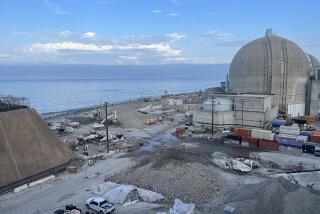Production of Tritium
- Share via
Your recent editorial (“Russian Roulette for No Reason,” Dec. 11) on the government’s Savannah River Site plant in South Carolina has led to the false perception that the plant is both unnecessary and dangerous to local residents.
Arguing that the U.S. does not need to restart the plant’s tritium production reactor because enough of the material can be mined from retired nuclear warheads to meet future needs is like arguing that surpluses of grain or cheese mean American farmers can store their tractors, lock the barn doors and take the next couple of years off. If farmers stop planting crops or feeding livestock, the nation is threatened with the loss of agricultural production capability due to idled equipment, unnourished soil and the migration of a skilled labor pool to other career pursuits.
Failure to bring the reactor on line would endanger our capacity to produce enough tritium to meet current and projected requirements. Nuclear reactors, like farm equipment and skilled workers, need to demonstrate a capability to fulfill production needs.
We must assure ourselves of that readiness now. Our start-up tests and a period of actual operation are the only ways to prove that our nation’s sole source for tritium production is capable of meeting our future requirements. If tests prove that K Reactor needs further improvement or is not a reliable source, an alternative--L Reactor, also at the Savannah River site--must be readied to take it place.
In any case, production of new tritium is more than a year away. One can neither grow a row of corn nor produce tritium gas by merely flipping a switch. It takes approximately six months for corn to go from planting to market; it takes tritium approximately 18 months to go from reactor to weapon in the field.
Secondly, nuclear explosions cannot occur from the government’s nuclear reactor at Savannah River, S.C. Even in the highly unlikely event that the reactor fuel melted, it would not cause a nuclear explosion.
JAMES D. WATKINS, Secretary of Energy, Washington, D.C.
More to Read
Sign up for Essential California
The most important California stories and recommendations in your inbox every morning.
You may occasionally receive promotional content from the Los Angeles Times.










